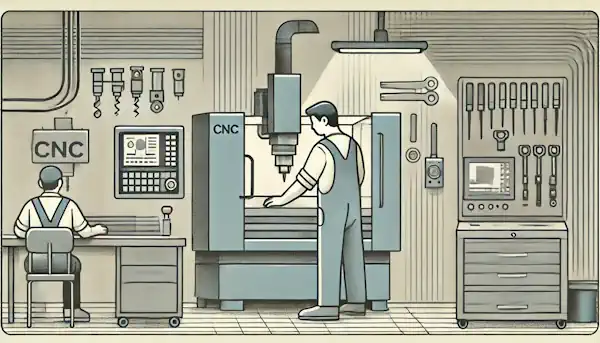A career as a CNC (Computer Numerical Control) operator can be a rewarding path for those interested in technology, precision manufacturing, and hands-on work. CNC operators are essential in industries such as automotive, aerospace, electronics, and furniture, helping to shape raw materials into parts or products using machines controlled by specialized software. This article explores the journey from training to securing a job as a CNC operator, outlining what you need to know to start your career.
What is a CNC Operator?
CNC operators are skilled technicians who work with CNC machines, which cut, shape, or grind metal, plastic, wood, or other materials. Their primary responsibility is to oversee the operation of these machines, ensuring the production process runs smoothly and that parts are manufactured to precise specifications.
What Does a CNC Operator Do?
Some of the common tasks CNC operators perform include:
- Setting up and preparing CNC machines for production.
- Loading raw materials such as metal or plastic into machines.
- Monitoring the machine’s operation to ensure it follows design specifications.
- Inspecting finished parts for accuracy and quality control.
- Performing routine maintenance on CNC equipment.
Steps to Become a CNC Operator
1. Obtain a High School Diploma or GED
To begin your career as a CNC operator, a high school diploma or GED is typically required. Courses in mathematics, physics, and computer programming will give you a strong foundation for the job. Familiarity with blueprints, technical drawings, and mechanical principles will also be beneficial.
2. Pursue Technical Training
Most CNC operators receive formal training from a technical school, community college, or trade school program. Programs typically offer courses in:
- CNC programming and machining
- Blueprint reading
- Materials science
- Precision measurement
- CAD/CAM software (Computer-Aided Design/Manufacturing)
These programs usually last between several months and two years, depending on the depth of the program and the credential you wish to obtain (e.g., certificate, diploma, or associate degree).
3. Earn Certifications (Optional but Recommended)
While not always required, earning certifications can make you a more competitive job candidate. The National Institute for Metalworking Skills (NIMS) offers certifications in various machining skills, including CNC operation and programming. These credentials demonstrate your competency and commitment to employers.
4. Gain Practical Experience
On-the-job training is essential for CNC operators. Many companies offer apprenticeships or entry-level positions where you can learn the nuances of CNC operation in a real-world environment. During this time, you will develop familiarity with specific machines, safety protocols, and production workflows.
5. Continue Learning
CNC technology is continuously evolving, with advancements in machinery and software. Stay current with trends by attending workshops, taking continuing education courses, or earning additional certifications to expand your skill set. As you gain experience, you might advance to roles such as CNC programmer, machinist, or production supervisor.
Where to Find CNC Operator Jobs

After completing your training, you’ll need to search for job openings. Consider the following strategies:
- Online Job Boards: Sites like Indeed, LinkedIn, and Glassdoor frequently list CNC operator job postings.
- Manufacturing Companies: Directly apply to manufacturers, machine shops, and industrial companies that utilize CNC technology.
- Apprenticeships: Look for CNC apprenticeships that offer hands-on experience and a pathway to full-time employment.
- Networking: Attend industry events, trade shows, or join local manufacturing associations to build professional connections.
Industries that commonly employ CNC operators include aerospace, automotive, defense, medical device manufacturing, and electronics.
Frequently Asked Questions (FAQs)
- What skills are required to be a CNC operator?
- Key skills include technical aptitude, attention to detail, problem-solving abilities, and an understanding of blueprints and mechanical systems. Knowledge of mathematics and computers is also important.
- How much do CNC operators make?
- Salaries vary based on location, experience, and industry. According to the U.S. Bureau of Labor Statistics (BLS), the median annual wage for CNC operators was approximately $45,750 as of 2022. Entry-level positions typically start around $35,000, while experienced operators or programmers can earn $60,000 or more.
- What is the job outlook for CNC operators?
- The demand for CNC operators is expected to grow steadily. As more industries adopt advanced manufacturing processes, the need for skilled CNC operators will increase. The BLS projects job growth for CNC machinists and operators to be about 3% from 2022 to 2032.
- Can I work as a CNC operator without experience?
- While experience is preferred, many employers offer entry-level positions or apprenticeships for those who have completed training programs. This allows you to gain practical experience on the job.
- How difficult is it to learn CNC operation?
- Learning CNC operation requires dedication, as it involves understanding both mechanical and software aspects. However, with the right training program and practice, most people can become proficient in operating CNC machines.
- Is CNC programming different from CNC operation?
- Yes. CNC operators typically focus on setting up and running machines, while CNC programmers write the G-code or other instructions that tell the machine how to perform tasks. Some CNC operators learn programming over time and move into more advanced roles.
- What types of machines do CNC operators use?
- CNC operators work with various machines, including CNC lathes, mills, routers, grinders, and plasma cutters. The type of machine used depends on the industry and materials involved.
Build a Successful Career as a CNC Operator
A career as a CNC operator offers stability, hands-on work, and opportunities for advancement. With the right training and commitment to continual learning, you can build a successful career in the manufacturing industry. Whether you enjoy working with technology or are drawn to the precision of machining, CNC operation provides a fulfilling pathway for those looking to enter a technical field.
